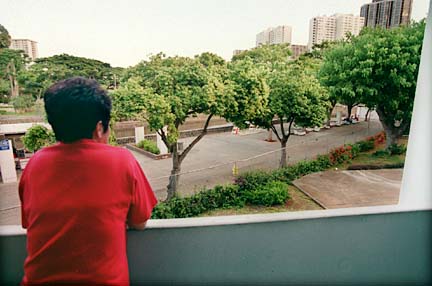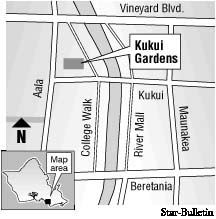Advertisement - Click to support our sponsors.


Homeless scare The view from the balconies of Kukui Gardens apartments can include homeless people bathing and doing laundry at a water fountain on the College Walk mall next door.
apartment residents
Tenants of Kukui Gardens
are afraid to leave the building,
especially after a girl was attackedBy Pat Gee
Star-BulletinThat type of activity has residents nervous about leaving the building to shop downtown.
Tenants are "so very, very afraid," said Celine Takahashi, Kukui Gardens manager.
That fear has escalated since Sept. 19, when a man who regularly hangs out at the nearby mall sexually attacked a resident's 14-year-old daughter in the laundry area about 9 p.m., Takahashi said.

Residents have complained to the city and police for several years about the homeless living at the mall, but nothing has been done, Takahashi said. The problem has grown since Aala Park, a popular homeless camping ground, closed two months ago for renovations, she said.The police have not enforced the closing of the mall from 10 p.m. to 5 a.m., she said, but worst of all is the noise of the "fighting, swearing, and screaming at all hours. The people wouldn't mind so much if they just kept quiet!"
The tenants, most of them elderly, formed their own neighborhood patrol years ago, but stopped when the homeless started throwing bottles at them, she said.
Police officer Glenn Luecke handles most of the complaints about the homeless in the downtown area. It is a frustrating, "hard job," he said, because there's not much the police can do except to put a Band-Aid on the problem.
He and a lot of officers realize the homeless don't have any place to go. Unless the homeless are creating a nuisance, the police cannot ask them to leave an area because that would violate their civil rights, Luecke said.
"But many don't want help, they enjoy living outside, and that's their prerogative," he said.
Luecke knows there are homeless who drink alcohol and urinate on the street and otherwise misbehave. These people are "giving the homeless a bad name. A lot of them are just trying to make it," he said.
Several homeless people in the area said they are forced by police to move out of the mall after 10 p.m. and are on the go the entire night looking for a safe place to sleep, or they sleep during the day.
They said they would not go to the Institute for Human Services, the only 24-hour emergency shelter on the island, because it is not safe, is unclean and overcrowded.
IHS Executive Director Lynn Maunakea said, "We're bumper to bumper at night" and "All different kinds of people stay here. 60-90 percent have a substance abuse or mental health problem." Some of them don't keep themselves clean, she added.
"Many don't want to be in close quarters or be with that population. Or they want to be free to do their drugs or prostitution and they can't do that here," she said.
A homeless woman named Betty who lives at the mall said the Kukui Gardens residents "should be thankful they have a home with a washer and dryer to keep their clothes clean" instead of looking down on them for having to do laundry in water fountains.
Honolulu City Council Chairman Jon Yoshimura said his office has "repeatedly requested the destruction" of covered concrete tables and chairs that the homeless use for shelters.
The Kukui Gardens residents have asked for that, "but we haven't been able to get the administration to do it. They do not believe that is the answer to the problem."
Aala Park is undergoing renovations to make it a more active park with basketball courts, a skating rink, walking paths and playing fields and to deter the homeless from taking over the park as a hangout. No covered shelter areas will be available, and they will be otherwise "environmentally encouraged not to stay there," Yoshimura said. The lighting will be bright enough to discourage crime, but not enough to bother nearby residents.